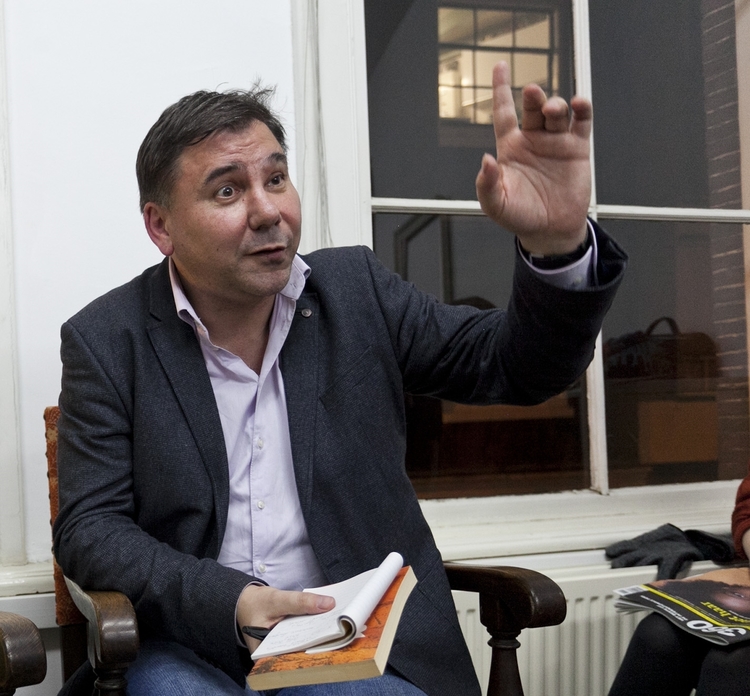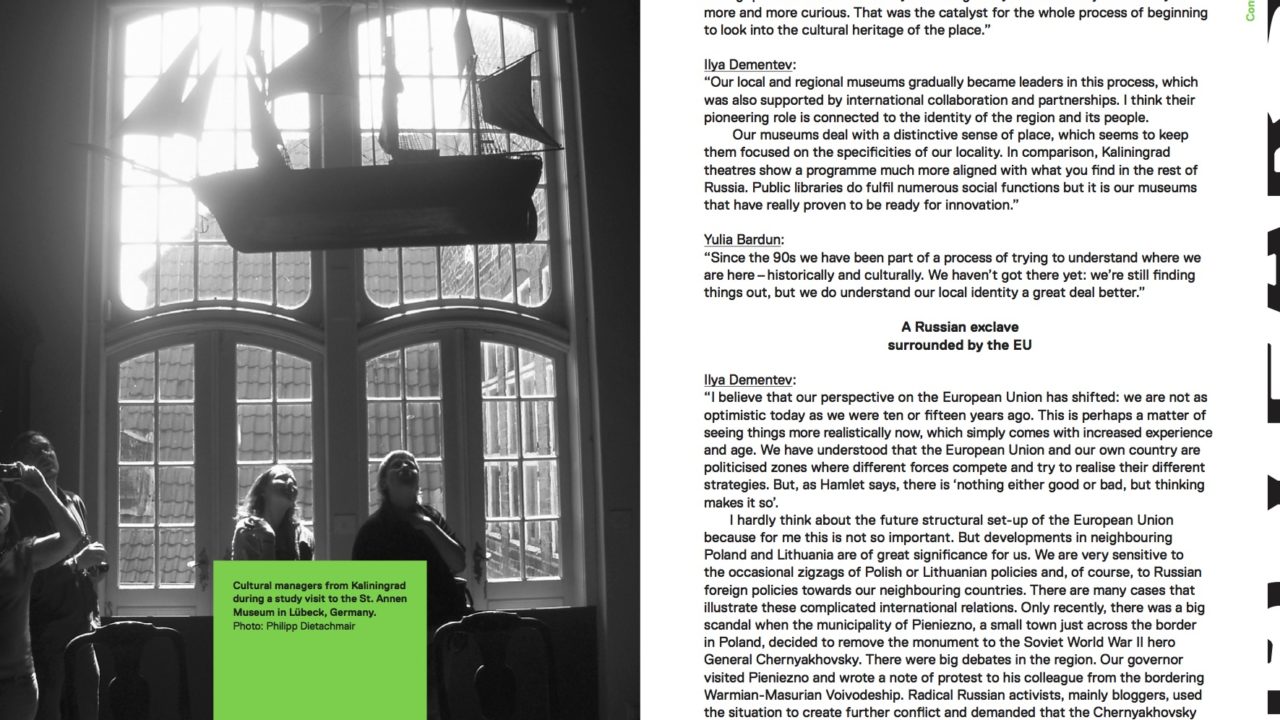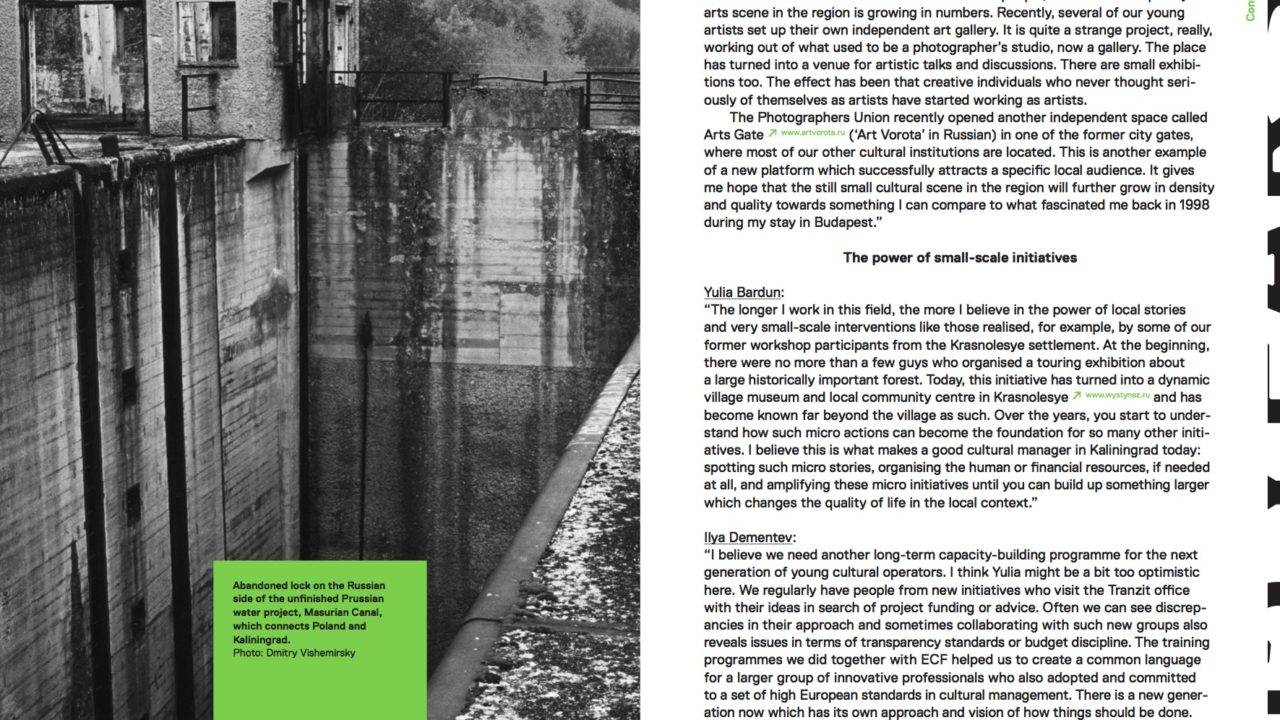Ivan Krastev in conversation with Philipp Dietachmair – Part 4
12 Feb 2016
Read Part 1: Looking Back ; Part 2: Identity Politics and Part 3: A Common Ground Across Geographies. A print-friendly version of the complete conversation is available for download (PDF)
15 Years in the Neighbourhood Ivan Krastev in conversation with Philipp Dietachmair
We continue our conversation with Ivan Krastev in this fourth instalment of a five-part interview. After we looked back at what the past 15 years have meant for the building of democratic European communities in part 1, we dove into the issues around the real division between people within our societies across the continent in part 2 and looked at concrete examples of this division across different countries in Europe in part 3. We now explore the possibilities of finding a new language.
We also invite our readers to join the dedicated ‘Another Europe’ Lab on ECF Labs where you can participate to the discussion on issues around these particular themes and download more texts on our work in the EU Neighbourhood as featured in our most recent publication Another Europe.

Part 4 – Finding a New Language
When we take a look at international and philanthropic programmes for the EU Neighbourhood countries we can see a number of working areas that seem to have a rather clear agenda – at least on the surface: Supporting freedom of expression, human rights, civil liberties, democratisation and so on. ECF’s work in the field of culture comes along with much more fluid concepts. Everybody has a more or less clear idea of what support for human rights activists entails, but when it comes to culture, people here and there can be confused as our work is not about a specific art form like opera or even supporting the arts in general. It is, like we discussed earlier, about developing empathy for example. How would you make the case for this rather complex system of transnational cultural collaboration contacts, which maybe hasn’t developed its own kind of generally understood agenda yet?
This is extremely important because this is also the way cultural programmes and, in my view, cultural foundations should help the European Union. We used to have these boxes we would check: we had a very clear idea of what we were doing, we knew it was what it was, clearly measurable and so on. This has changed now. We also used to talk a lot about the transformative power of the EU, and now we have discovered a new transformative power of the Neighbourhood over the EU – coming along with the developments around the refugees. So from this point of view, obviously, we need a different language. Of various possible initiatives, cultural programmes are the most capable to create this new language that connects to the other side, because people involved in such programmes are inherently talented to work with ideas and notions. I do believe that cultural programmes also have the important advantage that very often their focus is on individuals and not only on organisations.
We are now at a time when cultural foundations should say, “let’s talk first”. This approach should be more represented in how we want to present our side, what we want to achieve and, how we want to speak about things. For instance, is the best way to defend human rights really to send human rights monitors? We should be mindful, if we are not actually alienating a huge group of people by just blaming this or that government for not adopting this legislation, or violating that legislation? This approach is probably not going to impress a lot of people. But one can clearly see how strong the response is to some of the cultural productions which deal with these problems, that describe persecuted groups, be it gays or others. Because there is this human factor that cannot be easily put in a box and this is what makes cultural productions attractive, this is what cultural figures go for.
However, there is also a risk to reduce support of cultural productions only to those made by NGOs and similar organisations because these structures make it easy for us to fund. Now, it should also be about new ideas, about new words and especially also about new figures. In my view, foundations now also have the task to talk about this to policy-makers, especially in Brussels. We should change certain words. In certain moments, if we want to keep our value agenda alive, we also need to change the language.

ECF’s work with the western Russian region of Kaliningrad 2004-2009 involved a number of public institutions, such as the local museums, and took place in the framework of a mutually co-financed EU-Russia culture programme. It showed that in those times for a period of five, six years, interaction between EU–based and Russia-based public institutions was possible on an equal level. But when certain developments in Russia –which you described earlier, were set in motion many of these increasingly normal exchanges were almost immediately stopped, and from both sides. Our colleagues in Kaliningrad now face huge problems to keep up even basic cultural contacts to Poland, to Lithuania and others in the Baltic neighbourhood which are so vital for them.
I agree, what we had to discover in the last two or three years is the fragility of all these projects and networks we have created and that everything could basically disappear with one political decision – and boom, not any more … . The good news however is that I am convinced that in the next two or three years we’re only going to discover the actual resilience of some of these projects. People who were involved with them made the experience of genuinely talking to each other. One can cut money but one cannot cut real communication between real people, and people will just continue to like borrowing ideas. Following these first moments of disengagement we have seen the emergence of many people who are afraid or very much attracted by this new, powerful nationalistic discourse. But then again I am convinced, when we are talking about talented and reasonable people, they will start looking around soon again. Then we should start to reengage. This reengagement is probably not going to be immediately on the same level as before, but I do believe it is very important to keep up the contacts and also to try to have an understanding for some of their problems.
Let’s keep looking at Russia as an example, and more concretely at some of the figures inside the public administration. I always have this conversation with colleagues who are not part of the cultural sphere and who ask me, why I still keep friendly contacts with some of the experts that are now quite close to the Kremlin and other institutions. Firstly, because I want to know how they see the world. But secondly, because I’m entirely ready to recognise the complexity of their position. We should be very careful and not try to moralize others, instead, we should try to understand their choices. One needs to maintain real red lines of course, because there are people who do things that are simply unacceptable.
Where are the red lines for you?
There is one very simple and important red line: don’t harm other people! And this is a very important red line! I believe using your position of power, or even your position of a kind of public visibility, in order to destroy people who are in a difficult position, should in no way be tolerated, because this is an awful misuse of power. The fact that people have a different view than us on certain issues however is not reason enough for me to cut relationships. Even more, there is always a chance that on certain things they might be right.
One of the things that we should redevelop, and that unfortunately neither the European Union nor America did after the end of the Cold War –which is typical for all victorious powers, is the curiosity we have lost. We have the feeling that because of the end of the Cold War, we know better than anybody – I speak about a West which claims to know how things function. No, we should remain curious: for others, for their arguments, for their experiences. Curiosity can make opposite sides really understand that even when they disagree, they didn’t disagree right away and from the very beginning. If you are ready to first listen to something, you are also ready to talk about this most of the time.
I was recently told about a debate organised in Kharkiv by one of the key figures in the Ukrainian Euromaidan: writer and poet Serhiy Zhadan who invited a very strongly pro-Russian nationalistic poet from the Donbas region. This created a major divide with half of the audience which was protesting and leaving the room because of her presence. She was not even on the panel, but only present in the room. I have a huge respect for people like Zhadan, who was beaten during Euromaidan. He knows that because of his experience, it is up to him to invite this woman and to allow her to speak so he can tell her that he disagrees. But you always need to do this in a way that makes a next conversation possible. Shouting at each other is not helping. This is why cultural programmes are so very important because cultural figures from opposite sides are usually always among the most expressive and most committed advocates for their cause. And these programmes are exactly what should be done, these conversations need to happen. But strangely enough, such conversations somehow can happen more easily in Amsterdam than in Kharkiv. Ok, probably it would also be easier for some people to talk about issues with Islam in Dutch society in Kharkiv rather than in Amsterdam. The point is that I really do believe that we should use these types of different geographies of Europe to try and bring very different people’s ideas and audiences together.
I have always believed that the major hero of any democratic society is a person who is ready to change his/her opinion on the base of an argument. If we are losing this type of person, then we are losing a lot. Because of the fact that cultural programmes, more than other working fields- are not simply based on a rational argument but also on emotions, they should really try to praise the people who are ready to change their opinion based on something they have learned and that they didn’t know before. In my view, this should be at the heart of what we are doing. Because I do think this is also at the heart of what European culture stands for.

When we look at feedback from participants who have joined our Tandem Ukraine Cultural Exchange Programme in 2014, we see an interesting phenomenon: on the one hand we have of course some Ukraine-EU collaborations who engage with the burning political questions of the past years. But at least half of the group tells us how much they appreciate our programme because it supports them in doing what is important for their work and in their city and doesn’t force them to constantly discuss all the things that are so challenging for their country. There are so many international programmes which focus on conflict and politics now, they say Tandem offers a framework, a safe space where life continues ‘normally’ and participants can focus on their work within their local communities.
Good cultural programmes are like cooking and gardening: they are very local. There is no universal model. What works in one place is not necessarily going to work in another. There are places where people simply will not discuss what divides them. And people should be respected for this. They are buying time, just like Europe had been buying time in the 1940s and 50s. In the same Germany that we praise so much today there was a lot of silence back then. This silence basically turned out to be very productive because it was the silence that produced the 1960s and the opening of German society.
We cannot demand this productive silence from people everywhere of course, and in certain contexts, they need to shout at each other occasionally. But, as long as they shout at each other from face to face , that’s fine. What I’m afraid of is when people are shouting at each other from their own ghettos, and when they are starting to dehumanise the other side. New media is making this much easier. Because on Facebook, you are staying with people who share your views. We are much more ghetto prone than we realise, and yet, there are cultural problems to discuss. Yes, some people want to discuss –and in the end it could be even through opera, it could be anything. People should know that living together is not easy. This is kind of an important thing to understand and this is why cultural programmes should have a totally different space and position. They should not be perceived simply as support for better cultural policies or as cultural management education. We need to go back to the heart of what culture is: allowing people to live together, while keeping their differences well articulated. Tensions in our post-conflict societies are very high and this is how we are going to make it work.
After more than 15 years of our work with cultural initiatives in the EU Neighbourhood the past few years have confronted us with a serious reality-check for our work. Probably we altogether will need a perspective of at least another 15 years to turn the seeds of the many cultural initiatives which have managed to grow into small plants into something really bigger and influential.
Absolutely! And here you have, in my view, always two kinds of extremes: On the one hand you have people who basically always want to be very optimistic and teleological and want to believe that in ten or fifteen years you can totally change societies. And then there are the others who believe that nothing can be changed at all. Neither is true. There are going to be changes here and there of course, but it is important not to simplify. For example, we always believe that the younger generations are going to be much more open and liberal than the older ones. Not necessarily. It depends on many things. By the way, the very same open borders we created also mean that some of the most energetic and liberal young people are going to leave their societies very early on. Is this going to affect the life of the others who are staying? For sure.
I believe we need much more curiosity, should not fear complexity and cherish the knowledge that regardless of what you are doing, even at the end of your life, you’ll never know whether you have actually succeeded or not. I do believe that the difference between a business initiative, let’s say a construction project, and a cultural project is that success for the latter always comes much later. But it’s a success that is likely to stay because, unlike building just anything else like a new highway or something, a meaningful cultural undertaking really happens on the level of society as a whole.
Also see our Another Europe conversation with ECF’s partner organisation in Kaliningrad: Cross-border Cooperation: A Challenge and an Inspiration for Kaliningrad.
In the final part of our conversation (part 5), we look closely at civil society initiatives across the continent, the danger some cultural actors face in their local environments, and we conclude by evaluating the role of cultural institutions in realising the critical role attributed to culture in the current political context of Europe and its neighbourhood.
In the final part of our conversation (part 5), we look closely at civil society initiatives across the continent, the danger some cultural actors face in their local environments, and we conclude by evaluating the role of cultural institutions in realising the critical role attributed to culture in the current political context of Europe and its neighbourhood.
